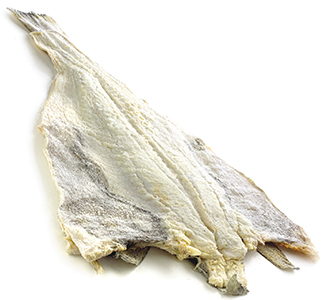Codfish fresh and (very) tasty.
Codfish
Cod, or codfish, is the common name for several species of fish classified in various genres, particularly in the Gadus genus belonging to the Gadidae family wich is said to be the "original", cod found in the Atlantic sea, called Gadus morhua, which is one of about 60 species of the same family of migrating fish. The Gadus live in cold northern sea sand is usually small in size, although some specimens can weigh up to 100 kg and measure little less than two meters. It feeds on other smaller fish such as herring.
Cod revolutionized our food habits because its conservation became possible thanks to the method of salting and drying. Besides guaranteeing its perfect conservation this method held all its qualities and strained the palate. The flesh of cod further facilitated its salty and dried conservation because of the very low fat and high protein concentration.

Nutritional Properties
Cod is rich in vitamins and essential minerals to a healthy nutrition.
Cod has low fat and is rich in high biological value proteins. Contains high levels of vitamins A, E, B6 and B12, sodium, calcium, phosphorus, magnesium and omega 3. Below are listed the major substances found in cod and their corresponding health benefits:
Fatty acids Omega 3 (alpha-linolenic acid, eicosapentaenoic acid and docosahexaenoic acid): This element has a strong protective effect for a healthy heart and an important role in the development of the brain.
Omega 3: improves concentration and memory, motor skills, increases motivation, reduces triglycerides, lowers blood pressure, prevents irregular heartbeat, increases the flow of blood and also counteracts stress.
Vitamin A: has a protective effect on vision, skin and mucous membranes.
Vitamin E: improves cellular oxygenation, helps with menstrual pain, increases muscle power and is essential in healing processes.
Vitamin B12: acts on red blood cells, nerve cells, hormonal balance, skin beauty and also helps the body immunization system and in controlling blood glucose levels.
Calcium: necessary for muscle contraction, contraction and expansion of the arteries, secretion of hormones and enzymes, and sending messages through the nervous system.
Magnesium: helps in muscle contraction and energy metabolism.
Sodium important electrolyte to nerve transmission, muscle contraction and fluid balance in the body.
Phosphorus: it has very important role in the formation of bones and teeth, also intervening in the chemical reactions that release energy.
